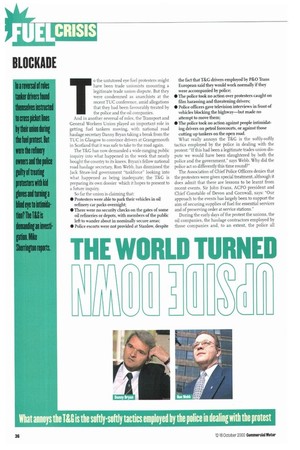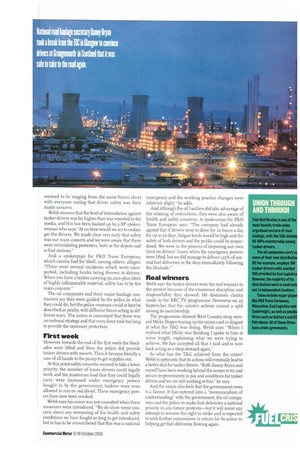THE WORLD TURNED T o the untutored eye fuel protesters might
Page 38

Page 39

If you've noticed an error in this article please click here to report it so we can fix it.
have been trade unionists mounting a legitimate trade union dispute. But they were condemned as anarchists at the recent TUC conference, amid allegations that they had been favourably treated by the police and the oil companies. And in another reversal of roles, the Transport and General Workers Union played an important role in getting fuel tankers moving, with national road haulage secretary Danny Bryan taking a break from the TUC in Glasgow to convince drivers at Grangemouth in Scotland that it was safe to take to the road again.
The T&G has now demanded a wide-ranging public inquiry into what happened in the week that nearly bought the country to its knees. Bryan's fellow national road haulage secretary, Ron Webb, has dismissed the Jack Straw-led government "taskforce" looking into what happened as being inadequate; the T&G is preparing its own dossier which it hopes to present to a future inquiry.
So far the union is claiming that: • Protesters were able to park their vehicles in oil refinery car parks overnight; • There were no security checks on the gates of some oil refineries or depots, with members of the public left to wander about in nominally secure areas; • Police escorts were not provided at Stanlow, despite the fact that T&G drivers employed by P&O Trans European said they would work normally if they were accompanied by police; • The police took no action over protesters caught on film harassing and threatening drivers; • Police officers gave television interviews in front of vehicles blocking the highway—but made no attempt to move them; • The police took no action against people intimidating drivers on petrol forecourts, or against those cutting up tankers on the open road.
What really annoys the T&G is the softly-softly tactics employed by the police in dealing with the protest: "If this had been a legitimate trades union dispute we would have been slaughtered by both the police and the government," says Webb. Why did the police act so differently this time round?" The Association of Chief Police Officers denies that the protesters were given special treatment, although it does admit that there are lessons to be learnt from recent events. Sir John Evans, ACPO president and Chief Constable of Devon and Cornwall, says: "Our approach to the events has largely been to support the aim of securing supplies of fuel for essential services and of preserving order at service stations."
During the early days of the protest the unions, the oil companies, the haulage contractors employed by those companies and, to an extent, the police all seemed to be singing from the same hymn sheet with everyone saying that driver safety was their major concern.
Webb stresses that the level of intimidation against tanker drivers was far higher than was reported in the media, and this has been backed up by a BP spokeswoman who says: At no time would we act to endanger the drivers. We made clear very early that safety was our main concern and we were aware that there were intimidating protesters, both at the depots and at fuel stations."
And a spokesman for P&O Trans European, which carries fuel for Shell, among others, alleges: "There were several incidents which went unreported, including bricks being thrown at drivers. When you have a tanker carrying 30,000-plus litres of highly inflammable material, safety has to be the main concern."
The oil companies and their major haulage contractors say they were guided by the police in what they could do, but the police response could at best be described as patchy, with different forces acting in different ways. The union is concerned that there was no national strategy and that every force took too long to provide the necessary protection.
First week
However, towards the end of the first week the blockades were lifted and then the police did provide tanker drivers with escorts. Then it became literally a case of all hands to the pump to get supplies out.
At this point safety concerns seemed to take a lower priority: the number of hours drivers could legally work and the maximum load that they could legally carry were increased under emergency powers bought in by the government; tankers were even allowed to run on red diesel. These emergency powers have now been revoked.
Webb says his union was not consulted when these measures were introduced. "We do show some concern about any worsening of the health and safety conditions we have fought so long to get introduced, but is has to be remembered that this was a national emergency and the working practice changes were relatively slight," he adds.
And although the oil hauliers did take advantage of the relaxing of restrictions, they were also aware of health and safety concerns. A spokesman for P&O Trans European says: "The company had already agreed that if drivers were to drive for io hours a day for up to 30 days, fatigue levels would be high and the safety of both drivers and the public could be jeopardised. We were in the process of imposing our own limit on drivers' hours when the emergency powers were lifted, but we did manage to deliver 123% of normal fuel deliveries in the days immediately following the blockade."
Real winners
Webb says the tanker drivers were the real winners in the protest because of the enormous discipline and responsibility they showed. He dismisses claims made in the BBC TV programme Panorama on 23 September that his union's actions caused a split among its membership.
The programme showed West Country shop steward Micky Diaper tearing up his union card in disgust at what the T&G was doing. Webb says: "When I realised what Micky was thinking I spoke to him at some length, explaining what we were trying to achieve. He has accepted all that I said and is now back acting as a shop steward again."
So what has the MG achieved from the crises? Webb is optimistic that its actions will eventually lead to a better deal for tanker drivers. "Both Danny Bryan and myself have been working behind the scenes to try and secure improvements in pay and conditions for tanker drivers and we are still working at this," he says.
And the union also feels that the government owes it a favour. It has entered into a "memorandum of understanding" with the government, the oil companies and the police to make fuel deliveries a national priority in any future protests—but it will resist any attempt to remove the right to strike and is expected to seek further concessions in return for its action in helping get fuel deliveries flowing again.












































































































